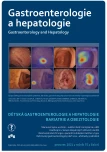-
Medical journals
- Career
Biosimilars monoclonal antibodies in the therapy of inflammatory bowel diseases An important milestone in the development of Crohn’s disease and ulcerative colitis therapy, or just a sophisticated generic?
Authors: Lukáš M.
Authors‘ workplace: Klinické a výzkumné centrum pro střevní záněty, Klinické centrum ISCARE a. s. a 1. LF UK v Praze
Published in: Gastroent Hepatol 2021; 75(6): 550-555
Category: IBD: Review Article
doi: https://doi.org/10.48095/ccgh2021550Overview
In 2013, EMA approved the first biosimilar infliximab CT-P13 for clinical practice in all indications of the original infliximab. Since 2015, biosimilar infliximab has been extensively used in patients with Crohn‘s disease and ulcerative colitis also in the Czech Republic. Biosimilar infliximab is very similar to the original infliximab in terms of its macromolecular structure, and its clinical effects, adverse events and immunogenicity are identical to those of the original infliximab. Biosimilar biologics which have been introduced in clinical practice significantly reduced therapeutic costs and improved access to an innovative therapy and facilitated a new therapeutic strategy, with pro-active drug monitoring and flexibility in dosing. Biosimilars are associated with a significant improvement in the therapeutic armamentarium, which makes them one of the important therapeutic milestones in the treatment of inflammatory bowel disease.
Keywords:
Ulcerative colitis – Crohn’s disease – biosimilars – biologic therapy
Sources
1. Lukáš M et al. Pokroky v diagnostice a léčbě idiopatických střevních zánětů. Praha: Galen 2019.
2. Jorgensen KK, Olsen IC, Goll GL et al. Switching from originator infliximab to biosimilat CT-P13 compared with maintained treatment with original infliximab (NOR-SWITCH): a randomised 52 week, randomised, double-blide, non-inferiority study. Lancet 2017; 389 (10086): 2304-2316. doi: http: //dx.doi.org/10.1016/ S0140-6736 (17) 30068-5.
3. Kennedy NA, Heap GA, Green HD et al. Predictors of anti-TNF therapy failure in anti-TNF. Lancet 2019; 4 (5): 341-353. doi: http: //dx.doi.org/10.1016/S2468-1253 (19) 30012-3.
4. Lukáš M. Biologická léčba idiopatických střevních zánětů. In: Pavelka K, Arenberger P, Lukáš M et al (eds). Biologická léčba zánětlivých autoimunitních onemocnění v revmatologii, dermatologii a gastroenterologii. Praha: Grada 2014.
5. Lukáš M et al. Idiopatické střevní záněty. Nové trendy a mezioborové souvislosti. Praha: Grada 2020.
6. Ahmed W, Galati J, Kumar et al. Dual biologic or small molecule therapy for treatment of inflammatory bowel disease: A systematic review and meta-analysis. Clin Gastro Hepatol 2021. In press. doi: https: //doi.org/10.1016/j.cgh.2021.03.034.
Labels
Paediatric gastroenterology Gastroenterology and hepatology Surgery
Article was published inGastroenterology and Hepatology

2021 Issue 6-
All articles in this issue
- Paediatric gastroenterology and hepatology
- Léčba obezity – aby se bariatricko-metabolická chirurgie nestala obětí vlastního úspěchu
- Azathioprine in the therapy of paediatric inflammatory bowel disease – part I: treatment indications, dosing and thiopurine-related adverse events
- Azathioprine in the therapy of paediatric inflammatory bowel disease – part II: pharmacodynamics, pharmacokinetics, and the possibilities of measuring its metabolites in clinical practice
- Gluten-related immunogenic peptides in stool as means to monitor compliance with gluten-free diet in children with newly diagnosed coeliac disease
- The role of bariatric surgery in patients with type 1 diabetes mellitus
- Diet after bariatric surgery in practice
- Spontaneous intramural duodenal hematoma in a young woman
- Assistance system for real-time polyp detection based on convolutional neural network
- Effect of ursodeoxycholic acid in postcholecystectomy cholestatic hepatopathy verified by ultrasonography
- Biosimilars monoclonal antibodies in the therapy of inflammatory bowel diseases An important milestone in the development of Crohn’s disease and ulcerative colitis therapy, or just a sophisticated generic?
- The selection from international journals
- Idiopatické střevní záněty. Nové trendy a mezioborové souvislosti
- Idiopatické střevní záněty II. Nové trendy a mezioborové souvislosti
- Gastroenterologie a hepatologie v algoritmech
- Prof. MUDr. Petr Dítě, DrSc., slaví 80 let
- Správná odpověď na předchozí kvíz Gastrointestinální stromální tumor
- Kreditovaný autodidaktický test: dětská gastroenterologie a hepatologie / bariatrie a obezitologie
- Janus kinase inhibitor in modern treatment of ulcerative colitis
- Smoking and oncology – offering smokers a scientifically based, less harmful alternative is ethical
- Ružinovský gastroenterologický deň 2021 5. november 2021
- The indications for performing colonoscopy in Iranian children – a cross-sectional study
- Gastroenterology and Hepatology
- Journal archive
- Current issue
- Online only
- About the journal
Most read in this issue- Azathioprine in the therapy of paediatric inflammatory bowel disease – part I: treatment indications, dosing and thiopurine-related adverse events
- Diet after bariatric surgery in practice
- Gluten-related immunogenic peptides in stool as means to monitor compliance with gluten-free diet in children with newly diagnosed coeliac disease
- Prof. MUDr. Petr Dítě, DrSc., slaví 80 let
Login#ADS_BOTTOM_SCRIPTS#Forgotten passwordEnter the email address that you registered with. We will send you instructions on how to set a new password.
- Career

